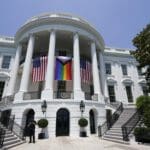Trump administration's new asylum rule poses danger to LGBTQ immigrants
The proposed rule would narrow what persecution means, excluding many LGBTQ asylum seekers.

The Trump administration is moving forward with a proposed rule that immigration advocates say would do major harm to LGBTQ asylum seekers.
The Justice Department and Department of Homeland Security submitted the proposed policy in June. The public comment period for the rule closed last week.
The proposed regulation would raise the standard for immigration judges to grant asylum claims, according to the New York Times. Asylum seekers who say they are being targeted by gangs or government officials, for instance, would have a higher likelihood of being denied.
As the Times notes, asylum officers would also have greater flexibility to label applications “frivolous.” Although LGBTQ people were not directly mentioned in the rule, experts on persecution of LGBTQ immigrants said they are already being asked to meet narrow definitions that often exclude their experiences of persecution — and this new proposal could make things worse.
The rule would change how “social group” and “persecution” are defined in a way that would hurt claims from LGBTQ asylum seekers, human rights experts say. It would also raise the bar on the kind of harm asylum seekers must show they’ve experienced in order to have their application approved, which the rule defines as “an extreme level of harm and does not encompass all possible forms of mistreatment.”
The “mere existence of potentially persecutory laws or policies is not enough to establish a well-founded fear of persecution,” the rule states. The laws or policies must be widespread and systemic or the asylum seeker must have evidence that the laws or policies would impact the applicant personally.
It also provides nine circumstances under which applicants would need more evidence to prove they were part of a social group that qualifies for asylum, which advocates say would exclude many LGBTQ people. These circumstances include “interpersonal disputes of which governmental authorities were unaware or uninvolved,” which often involve violence enforcing gender norms, advocates say.
“By dismissing violence against women or LGBT people as simply an ‘interpersonal dispute’ the proposed rule fails to recognize that gender-based violence is a social means to subordinate rather than an individual problem, requiring comprehensive responses, including state measures to comply with obligations to prevent, investigate, prosecute and punish,” Human Rights Watch wrote in its public comment on the proposal.
Virginia Goggin, director of legal services at the New York City Anti-Violence Project, stated in a separate comment that the very existence of laws that criminalize LGBTQ people is sufficient to establish fear of persecution regardless of whether people are frequently prosecuted under them. Goggin said these laws forcibly closet people and allow government actors and civilians to harm LGBTQ people with impunity, among other things.
In a press release, the Justice Department said it proposed the rule because it would allow agencies to “more effectively separate baseless claims from meritorious ones” and “would better ensure groundless claims do not delay or divert resources from deserving claims.”
Sharita Gruberg, senior director for the LGBTQ Research and Communications Project at the Center for American Progress, said the proposed changes would “create insurmountable barriers for LGBTQ people, depriving them of their right under U.S. and international law to seek humanitarian protection and essentially eliminating asylum protections.”
“If this proposed rule goes into effect, countless LGBTQ people will be subjected to unclear and potentially unlawful standards with virtually no safeguards for due process and returned to countries where their lives are in danger,” Gruberg added.
Bridget Crawford, legal director for Immigration Equality, said that the proposed regulation means that almost no one would be deemed eligible for asylum.
“The Trump administration’s attempt to abolish asylum cuts at the very heart of who we should be as a nation: a beacon of hope for people fleeing persecution,” Crawford said in a statement. “If enacted, this regulation would mean that LGBTQ and HIV-positive immigrants treated like criminals in their countries of origin would not be able to seek safe haven in the U.S.”
Last Wednesday was the final opportunity for groups and experts opposing or supporting the rule to leave public comments for the agency, which will then be reviewed.
Once agencies move forward with the final rule, they often acknowledge the criticisms of the rule through the public comment process. According to the Associated Press, there were 80,000 public comments against the proposed asylum rule.
Published with permission of The American Independent Foundation.
Recommended

Alaska House committee advances, expands proposal to bar trans girls from girls sports
Amended bill would add elementary, middle school and collegiate sports to limits in place for high school
By Claire Stremple, Alaska Beacon - April 16, 2024
Bills targeting trans people are on the rise nationwide and in Alaska — most focus on children
House committee advances legislation that would restrict the rights of Alaska trans kids
By Claire Stremple, Alaska Beacon - April 01, 2024
Anti-abortion, anti-LGBTQ resolutions to be voted on at state Republican convention
A resolution to be considered by North Dakota Republican Party delegates at their upcoming convention would define life as beginning at fertilization and call for criminal penalties for “anyone who kills a pre-born human being.”
By Michael Achterling, North Dakota Monitor - March 26, 2024









































































